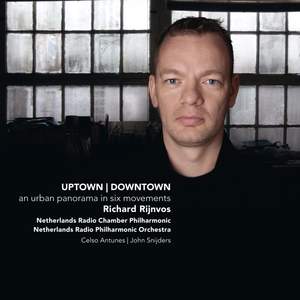The orchestral ode to urban life in New York Uptown|Downtown by highly regarded Dutch composer Richard Rijnvos is given its world premiere recording on Challenge Classics. Its two triptychs, which can be performed independently of each other, are a piano concerto called NYConcerto, and three Manhattan Square Dances for double orchestra, named after squares in the American metropolis. The Netherlands Radio Philharmonic Orchestra and Netherlands Radio Chamber Philharmonic are conducted by Celso Antunes with pianist John Sijders the soloist in the concerto.
Currently Head of Composition in the Music Department of Durham University, Richard Rijnvos was born 1964 in Tilburg in the Netherlands. He studied composition with Jan van Vlijmen and Brian Ferneyhough at the Royal Conservatoire in The Hague, and later came into contact with Morton Feldman and John Cage, who caused crucial changes in his development. He’s also been influenced greatly by extramusical artists such as William Burroughs, Samuel Beckett, Joseph Beuys and Italo Calvino. Since 1993 he has concentrated on the realisation of compositions that are parts of larger series.
Rijnvos completed Uptown|Downtown, “an urban panorama in six movements”, in 2008. A hectic dance quality characterizes the whole series - which began in 1996 with Times Square Dance. The dual nature of the two stereophonically positioned chamber orchestras refers to the Twin Towers which then so dominated the Manhattan skyline. In Washington Square Dance Rijnvos literally incorporates chess boards in the piece, as magic squares that are the source material of the music, while Union Square Dance is euphoric, incessant and unceasing, as is to be expected from a finale.
The three up-tempo movements of NYConcerto for piano and chamber orchestra took as their point of departure the music of other composers. In Grand Central Dance, Times Square Dance and ’cross Broadway he quotes George Gershwin, Charles Ives and Thelonious Monk respectively. There are also nods to others – for instance, Broadway composer Vincent Youmans’ Tea for Two in the last part and Bernard Herrmann’s music for the Hitchcock film North by Northwest (which has a scene in Grand Central Station) in the first.





